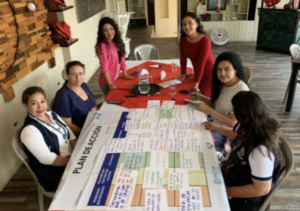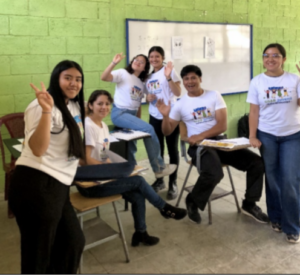In the community of Santa Cruz Barillas, in the western highlands of Huehuetenango in Guatemala, a shared dream between adolescents and health care providers was in the making. The vision was clear: to ensure that young people have access to high-quality, comprehensive health services.
Despite efforts to strengthen the community’s health system, which have included equipping facilities and training staff, lasting improvements in the quality of health services have not been achieved, especially for adolescents and youth ages 10 to 24 years old.

Many barriers prevent young people from obtaining adequate health information and access to health services near their homes, beginning with where to start. In a survey of adolescents and youth, the problem most often mentioned was the lack of knowledge about the availability of services. One adolescent pointed out, “I don’t know what services there are for youth at the health center.” Without knowledge and access to services, young people do not have the opportunity to dig into the critical issues around quality and respect.
To address this problem, the U.S. Agency for International Development (USAID) Health and Nutrition Project (Proyecto de Salud y Nutrición), implemented by Jhpiego, has promoted partnering with young people and has invited young community members to get involved and support services through community mobilization. The project works with OSAR-Juvenil (Observatorio en Salud Sexual y Reproductiva), an organization of young people for young people that advocates for access to comprehensive sexual education for adolescents and youth.
At the end of 2023, the Santa Cruz Barillas Health Center took a significant step by opening its doors to Partnership Defined Quality (PDQ) for Youth, a process to improve quality and access to services through community involvement. The process has four stages—building support, exploring quality, closing gaps and working together. Engaging youth in planning health services that meet their needs is not customary in Guatemala, where roles and responsibilities are more traditional in scope. But using a time-tested, evidence-based approach to involve youth in the process proved productive.
OSAR-Juvenil facilitated the PDQ process, adopting the theme, “adolescents and health services defining and improving the quality of health service provision.”

Health care providers participated in a workshop to explore the quality of care they provide. Through reflective exercises and in-depth discussions, they identified areas for improvement in their daily practice. In parallel, a group of adolescents organized by OSAR-Juvenil explored their views on adolescent health care, defining what quality meant to them and highlighting both the strengths and weaknesses of existing health services. They had concerns such as “Will I be discriminated for being young?”
Health care providers and adolescents met to close gaps in their vision of quality care and to find innovative solutions to the problems they identified. Together, they categorized the information gathered during the previous sessions and prioritized the most urgent needs. This collaborative process was critical to ensure that the proposed solutions addressed the adolescents’ real concerns.
They met again to define a joint vision for comprehensive, adolescent-friendly services and developed a detailed quality improvement action plan. With specific objectives and clear strategies, they committed to work together to transform adolescent care in Santa Cruz Barillas.
A referral voucher, cupón de referencia, designed to encourage adolescent participation in their health and services, was presented and enthusiastically received, marking a promising start.
The next step is to implement the action plan, but the road traveled so far is already a testament to the power of collaboration and commitment. This work is an inspiring example of how high-quality, adolescent-responsive health care can become reality when a community and health care providers come together for a common purpose.
Meghan Greeley, Jhpiego’s Sr. Technical Advisor for Adolescent Health, provided technical review of this story.
Haydee Ileanova Lemus, Gender and Social and Behavior Change Communication Advisor, and Fernando Arevalo, Communications and Knowledge Management Senior Specialist, work in Jhpiego’s Guatemala office.
Photos courtesy of ISDM for the USAID Health and Nutrition Project. July 2024



